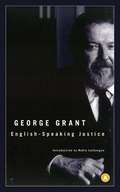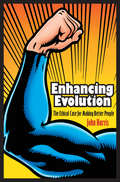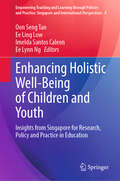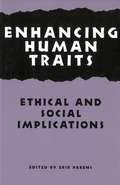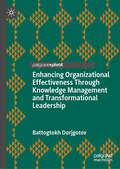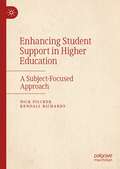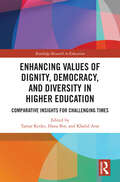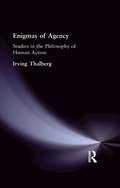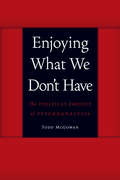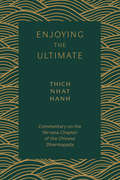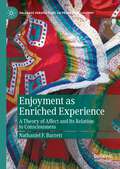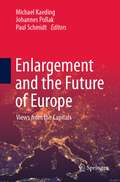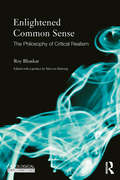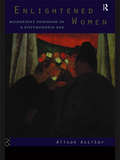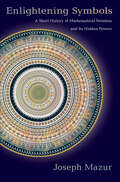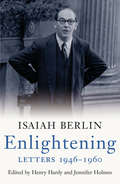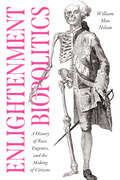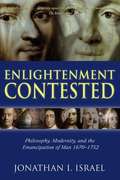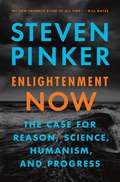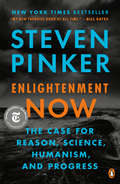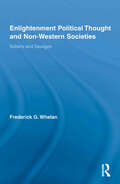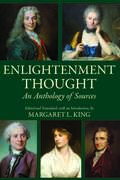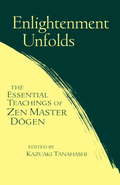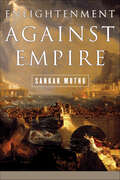- Table View
- List View
English-Speaking Justice
by George GrantEnglish-Speaking Justice was first delivered during The Josiah Wood Lectures at Mount Allison University in 1974 and was published by the University in 1978. Anansi is pleased to co-publish the present edition with the University of Notre Dame Press. The text is essentially the same as the Mount Allison edition, except for the expansion of certain citations in the footnotes.
English-Speaking Justice
by George GrantGeorge Grant's magnificent four-part meditation sums up much that is central to his own thought, including a critique of modern liberalism, an analysis of John Rawls's Theory of Justice, and insights into the larger Western philosophical tradition. This edition contains an introduction by Grant scholar Dr Robin Lathangue.
Enhancing Evolution: The Ethical Case for Making Better People (Science Essentials Ser.)
by John HarrisIn Enhancing Evolution, leading bioethicist John Harris dismantles objections to genetic engineering, stem-cell research, designer babies, and cloning and makes an ethical case for biotechnology that is both forthright and rigorous. Human enhancement, Harris argues, is a good thing--good morally, good for individuals, good as social policy, and good for a genetic heritage that needs serious improvement. Enhancing Evolution defends biotechnological interventions that could allow us to live longer, healthier, and even happier lives by, for example, providing us with immunity from cancer and HIV/AIDS. Further, Harris champions the possibility of influencing the very course of evolution to give us increased mental and physical powers--from reasoning, concentration, and memory to strength, stamina, and reaction speed. Indeed, he says, it's not only morally defensible to enhance ourselves; in some cases, it's morally obligatory. In a new preface, Harris offers a glimpse at the new science and technology to come, equipping readers with the knowledge to assess the ethics and policy dimensions of future forms of human enhancement.
Enhancing Holistic Well-Being of Children and Youth: Insights from Singapore for Research, Policy and Practice in Education (Empowering Teaching and Learning through Policies and Practice: Singapore and International Perspectives #4)
by Ee Ling Low Oon Seng Tan Imelda Santos Caleon Ee Lynn NgThis book documents and chronicles current research and initiatives, and growing knowledge base about well-being, in a Singapore context. In Singapore, the well-being of children and youth has been the subject of research and policy efforts. This is reflective of global and national concerns on the care of the young and those at risk of maladaptive outcomes, the nurturing of emotional health and resilience, and development of social and psychological resources. The chapters present a brief yet comprehensive summary of current insights on the well-being of children, adolescents, teachers, parents, and caregivers within the context of Singapore. This book highlights important issues and gaps in research related to the well-being of children and adolescents that are also relevant to the global community. It also provides recommendations for future directions that will be useful to researchers, policymakers, practitioners, parents, and other key stakeholders.
Enhancing Human Traits: Ethical and Social Implications
by Erik ParensIn this volume, scholars from philosophy, sociology, history, theology, women's studies, and law explore the looming ethical and social implications of new biotechnologies that are rapidly making it possible to enhance an individual's mental and physical attributes in ways previously only imagined. To clarify the issues, the contributors grapple with the central concept of "enhancement" and probe the uses and abuses of the term. Focusing in particular on the moral issues pertaining to cosmetic surgery and cosmetic psychopharmacology (a category which includes Prozac), they also examine notions of identity, authenticity, normality, and complicity. Other essays in this collection address the social ramifications of the new technologies, including the problems of access and fairness.
Enhancing Organizational Effectiveness Through Knowledge Management and Transformational Leadership
by Battogtokh DorjgotovThis book introduces the study of the impacts on organizational culture, strategy, technology, human resource development (HRD), transformational leadership, knowledge management, and organizational effectiveness using a hypothesis-driven model. The model posits that organizational culture, technology, strategy, and HRD are essential preconditions for effective knowledge management, which is further enhanced by transformational leadership. Focusing on Research and Development (R&D) organizations, specifically the research institutes of the Mongolian Academy of Sciences, the study examines how these factors collectively improve organizational effectiveness. Concluding with practical recommendations for R&D specialists and managers, the book offers insights into enhancing organizational efficiency through strategic leadership and robust knowledge management practices.
Enhancing Student Support in Higher Education: A Subject-Focused Approach
by Nick Pilcher Kendall RichardsThis book is about supporting students in Higher Education using language, and specifically using a combination of written text based linguistic approaches alongside and with other non-text related languages. The authors call this a beyond-text subject based approach and argue that this can more effectively help students. The book first outlines and describes a ‘paradigm of linguistics’ that sees support as being only possible through linguistics written text approaches. It then describes how the authors have found through their own research studies that such approaches do not go far enough to best support students. They offer alternatives and justify them theoretically and empirically, and also suggest ways in which others can use similar approaches to best support students in HE. This book will be of interest to practitioners, students, teachers and researchers in the fields of Applied Linguistics, TESOL, English Medium Instruction (EMI), EAP and language education policy.
Enhancing Values of Dignity, Democracy, and Diversity in Higher Education: Comparative Insights for Challenging Times (Routledge Research in Higher Education)
by Tamar Ketko, Hana Bor, and Khalid ArarContesting a gradual disregard for the values of Dignity, Democracy, and Diversity in higher education, this volume explores best practices from universities and colleges in Israel and the USA to illustrate how these values can offer a holistic values framework for higher education globally. Presenting a range of interdisciplinary chapters from fields including history, philosophy, memorial studies, cultural, political, gender, and religious studies, the text considers how these values can be reflected in policy and practice across all areas of the university, including teaching and learning, admissions, students’ affairs, staff well-being, and institutional identity. The volume highlights constructive theories, experimental models, and case studies that collectively inform a holistic framework for moral, ethical, and equitable higher education worldwide. Offering key insights into the relevant discourse regarding local and global events that have impacted both Israelis and Americans, this volume will appeal to researchers in the fields of higher education, sociology of education, and philosophy of education, as well as postgraduates and scholars with interests in the transformation of higher education in light of contemporary times and challenges.
Enigmas of Agency: Studies in the Philosophy of Human Action
by Irving ThalbergFirst published in 2002. Routledge is an imprint of Taylor & Francis, an informa company.
Enjoying What We Don't Have: The Political Project of Psychoanalysis (Symploke Studies in Contemporary Theory)
by Todd McGowanAlthough there have been many attempts to apply the ideas of psychoanalysis to political thought, this book is the first to identify the political project inherent in the fundamental tenets of psychoanalysis. And this political project, Todd McGowan contends, provides an avenue for emancipatory politics after the failure of Marxism in the twentieth century.Where others seeking the political import of psychoanalysis have looked to Freud&’s early work on sexuality, McGowan focuses on Freud&’s discovery of the death drive and Jacques Lacan&’s elaboration of this concept. He argues that the self-destruction occurring as a result of the death drive is the foundational act of emancipation around which we should construct our political philosophy. Psychoanalysis offers the possibility for thinking about emancipation not as an act of overcoming loss but as the embrace of loss. It is only through the embrace of loss, McGowan suggests, that we find the path to enjoyment, and enjoyment is the determinative factor in all political struggles—and only in a political project that embraces the centrality of loss will we find a viable alternative to global capitalism.
Enjoying the Ultimate: Commentary on the Nirvana Chapter of the Chinese Dharmapada
by Thich Nhat HanhFor Buddhists seeking perfection, the Sanskrit word "nirvana" is held as the unreachable goal. But in this definitive, direct translation of the Chinese Dharmapada by Zen Master Thich Nhat Hanh, nirvana is not what you think it is."Nirvana is our daily business," Thich Nhat Hanh says. Based on talks given in his home monastery of Plum Village in France at the peak of his long teaching career, The Nirvana Chapter conveys Thich Nhat Hanh's insights on the 36 verses on nirvana in the Chinese Dharmapada. Described there as "the absence of notions that cause suffering," we discover that nirvana can be experienced at any time. Previously unavailable in English, these teachings on the experiential path which can help us touch nirvana are an "instant classic" for Buddhists and meditation practitioners.With his fluency in Classical Chinese and his knowledge of Sanskrit and Pali, Thich Nhat Hanh is the perfect guide to lead the way to a new understanding of nirvana for an international audience. Through his commentary, ranging freely in his vast knowledge of Vietnamese Buddhist history, we gain a master practitioner's view of a tradition of Zen Buddhism that has been, until now, inaccessible to Western students. We also gain insights into the elusive "space outside of space" of nirvana's ultimate dimension.
Enjoyment as Enriched Experience: A Theory of Affect and Its Relation to Consciousness (Palgrave Perspectives on Process Philosophy)
by Nathaniel F. BarrettThis book has two main tasks: (1) to call attention to the special challenges presented by our experience of affect—all varieties of pleasure and pain—and (2) to show how these challenges can be overcome by an “enrichment approach” that understands affect as the enrichment or deterioration of conscious activity as a whole. This “enrichment approach” draws from Alfred North Whitehead as well as the pragmatists John Dewey and William James, all of whom thought of affect as a fundamental aspect of experience rather than a special class of feelings. It also draws from recent scientific research that suggests that the dynamic repertoire of consciousness can change, effectively expanding and contracting our capacity to feel. Weaving these perspectives together, the book develops a theory that accounts for the peculiar phenomenology of affect and sheds new light on a diverse range of experiences, from everyday pleasures and pains to the special satisfactions of the arts and religious festivity. At the same time, it presents a fresh and distinctively affect-centered perspective on the nature of consciousness.
Enlargement and the Future of Europe: Views from the Capitals
by Michael Kaeding Paul Schmidt Johannes PollakThis book analyses Member States’ and EU neighbours’ national visions for the enlargement of the European Union (EU), highlighting 41 national histories, policies, and corresponding public perceptions of European integration. In a geopolitical context in which Russia’s war of aggression in Ukraine has renewed the impetus for EU enlargement, national views vary considerably on the timing, conditions, and reforms necessary to welcome Eastern neighbours and the Western Balkans countries into the European family. Moreover, EU enlargement policy is not only an investment in peace and stability; it has also become a political tool in response to the exploitation of interdependencies and illiberal pressures. This book presents concrete policy recommendations to national governments and the EU on how to move forward productively.
Enlightened Common Sense: The Philosophy of Critical Realism
by Roy BhaskarSince the 1970s, critical realism has grown to address a range of subjects, including economics, philosophy, science, and religion. It has become a complex and mature philosophy. Enlightened Common Sense: The Philosophy of Critical Realism looks back over this development in one concise and accessible volume. The late Roy Bhaskar was critical realism’s philosophical originator and chief exponent. He draws on a lifetime’s experience to give a definitive, systematic account of this increasingly influential, international and multidisciplinary approach. Critical realism’s key element has always been its vindication and deepening of our understanding of ontology. Arguing that realist ontology is inexorable in knowledge and action, Bhaskar sees this as the key to a new enlightened common sense. From the definition of critical realism and its applicability in the social sciences, to explanation of dialectical critical realism and the philosophy of metaReality, this is the essential introduction for students of critical realism.
Enlightened Women: Modernist Feminism in a Postmodern Age
by Alison AssiterThis is a bold and controversial feminist, philosophical critique of postmodernism. Whilst providing a brief and accessible introduction to postmodernist feminist thought, Enlightened Women is also a unique defence of realism and enlightenment philosophy. The first half of the book covers an analysis of some of the most influential postmodernist theorists, such as Luce Irigaray and Judith Butler. In the second half Alison Assiter advocates a return to modernism in feminism. She argues, against the current orthodoxy, that there can be a distinction between "sex" and "gender". For students trying to pick their way through the maze of literature in the area of postmodernist feminism, Enlightened Women is a concise guide to contemporary thought - as well as a radical contribution to the debate.
Enlightening Symbols: A Short History of Mathematical Notation and Its Hidden Powers
by Joseph MazurAn entertaining look at the origins of mathematical symbolsWhile all of us regularly use basic math symbols such as those for plus, minus, and equals, few of us know that many of these symbols weren't available before the sixteenth century. What did mathematicians rely on for their work before then? And how did mathematical notations evolve into what we know today? In Enlightening Symbols, popular math writer Joseph Mazur explains the fascinating history behind the development of our mathematical notation system. He shows how symbols were used initially, how one symbol replaced another over time, and how written math was conveyed before and after symbols became widely adopted.Traversing mathematical history and the foundations of numerals in different cultures, Mazur looks at how historians have disagreed over the origins of the numerical system for the past two centuries. He follows the transfigurations of algebra from a rhetorical style to a symbolic one, demonstrating that most algebra before the sixteenth century was written in prose or in verse employing the written names of numerals. Mazur also investigates the subconscious and psychological effects that mathematical symbols have had on mathematical thought, moods, meaning, communication, and comprehension. He considers how these symbols influence us (through similarity, association, identity, resemblance, and repeated imagery), how they lead to new ideas by subconscious associations, how they make connections between experience and the unknown, and how they contribute to the communication of basic mathematics.From words to abbreviations to symbols, this book shows how math evolved to the familiar forms we use today.
Enlightening: Letters 1946 - 1960
by Isaiah Berlin'People are my landscape', Isaiah Berlin liked to say, and nowhere is the truth of this observation more evident than in his letters. He is a fascinated watcher of human beings in all their variety, and revels in describing them to his many correspondents. His letters combine ironic social comedy and a passionate concern for individual freedom. His interpretation of political events, historical and contemporary, and his views on how life should be lived, are always grounded in the personal, and his fiercest condemnation is reserved for purveyors of grand abstract theories that ignore what people are really like.This second volume of Berlin's letters takes up the story when, after war service in the United States, he returns to life as an Oxford don. Against the background of post-war austerity, the letters chart years of academic frustration and self-doubt, the intellectual explosion when he moves from philosophy to the history of ideas, his growing national fame as broadcaster and lecturer, the publication of some of his best-known works, his election to a professorship, and his reaction to knighthood.These are the years, too, of momentous developments in his private life: the bachelor don's loss of sexual innocence, the emotional turmoil of his father's death, his courtship of a married woman and transformation into husband and stepfather. Above all, these revealing letters vividly display Berlin's effervescent personality - often infuriating, but always irresistible.
Enlightenment Biopolitics: A History of Race, Eugenics, and the Making of Citizens (The Life of Ideas)
by William Max NelsonA wide-ranging history tracing the birth of biopolitics in Enlightenment thought and its aftermath. In Enlightenment Biopolitics, historian William Max Nelson pursues the ambitious task of tracing the context in which biopolitical thought emerged and circulated. He locates that context in the Enlightenment when emancipatory ideals sat alongside the horrors of colonialism, slavery, and race-based discrimination. In fact, these did not just coexist, Nelson argues; they were actually mutually constitutive of Enlightenment ideals. In this book, Nelson focuses on Enlightenment-era visions of eugenics (including proposals to establish programs of selective breeding), forms of penal slavery, and spurious biological arguments about the supposed inferiority of particular groups. The Enlightenment, he shows, was rife with efforts to shape, harness, and “organize” the minds and especially the bodies of subjects and citizens. In his reading of the birth of biopolitics and its transformations, Nelson examines the shocking conceptual and practical connections between inclusion and exclusion, equality and inequality, rights and race, and the supposed “improvement of the human species” and practices of dehumanization.
Enlightenment Contested: Philosophy, Modernity, and the Emancipation of Man 1670-1752
by Jonathan I. IsraelJonathan Israel presents the first major reassessment of the Western Enlightenment for a generation. Continuing the story he began in the best-selling Radical Enlightenment , and now focusing his attention on the first half of the eighteenth century, he returns to the original sources to offer a groundbreaking new perspective on the nature and development of the most important currents in modern thought.
Enlightenment Now: The Case for Reason, Science, Humanism, and Progress
by Steven PinkerIs the world really falling apart? Is the ideal of progress obsolete? In this elegant assessment of the human condition in the third millennium, cognitive scientist and public intellectual Steven Pinker urges us to step back from the gory headlines and prophecies of doom, which play to our psychological biases. Instead, follow the data: In seventy-five jaw-dropping graphs, Pinker shows that life, health, prosperity, safety, peace, knowledge, and happiness are on the rise, not just in the West, but worldwide. This progress is not the result of some cosmic force. It is a gift of the Enlightenment: the conviction that reason and science can enhance human flourishing. Far from being a naïve hope, the Enlightenment, we now know, has worked. But more than ever, it needs a vigorous defense. The Enlightenment project swims against currents of human nature--tribalism, authoritarianism, demonization, magical thinking--which demagogues are all too willing to exploit. Many commentators, committed to political, religious, or romantic ideologies, fight a rearguard action against it. The result is a corrosive fatalism and a willingness to wreck the precious institutions of liberal democracy and global cooperation. With intellectual depth and literary flair, Enlightenment Now makes the case for reason, science, and humanism: the ideals we need to confront our problems and continue our progress.
Enlightenment Now: The Case for Reason, Science, Humanism, and Progress
by Steven Pinker<P> If you think the world is coming to an end, think again. Steven Pinker presents the big picture of human progress: people are living longer, healthier, freer, and happier lives, and while our problems are formidable, the solutions lie in the Enlightenment ideal of using reason and science.Is the world really falling apart? Is the ideal of progress obsolete? <P> In this elegant assessment of the human condition in the third millennium, cognitive scientist and public intellectual Steven Pinker urges us to step back from the gory headlines and prophecies of doom, which play to our psychological biases. <P>Instead, follow the data: In seventy-five jaw-dropping graphs, Pinker shows that life, health, prosperity, safety, peace, knowledge, and happiness are on the rise, not just in the West, but worldwide. This progress is not the result of some cosmic force. It is a gift of the Enlightenment: the conviction that reason and science can enhance human flourishing.Far from being a naïve hope, the Enlightenment, we now know, has worked. But more than ever, it needs a vigorous defense. <P>The Enlightenment project swims against currents of human nature--tribalism, authoritarianism, demonization, magical thinking--which demagogues are all too willing to exploit. Many commentators, committed to political, religious, or romantic ideologies, fight a rearguard action against it. The result is a corrosive fatalism and a willingness to wreck the precious institutions of liberal democracy and global cooperation. With intellectual depth and literary flair, Enlightenment Now makes the case for reason, science, and humanism: the ideals we need to confront our problems and continue our progress. <P><b>A New York Times Bestseller</b>
Enlightenment Political Thought and Non-Western Societies: Sultans and Savages (Routledge Studies in Social and Political Thought)
by Frederick G. WhelanFrederick G. Whelan, a leading scholar of Enlightenment political thought, provides an illuminating and incisive interpretation of key eighteenth and nineteenth century European political thinkers' accounts and assessments of the societies and political institutes of the non-Western world. These writers opened up a major new comparative dimension for political theory and its project both to explain and evaluate different political regimes. While the intellectual confrontation of European thinkers with alien cultures tended on the whole to confirm Westerners' sense of the superiority of their own institutions, it was also characterized – during the Enlightenment more so than later – by convictions regarding a common humanity and a corresponding sympathetic curiosity about different ways of life, however primitive or exotic they might appear. This book will be of interest to students and scholars of both political philosophy and thought as well as historians of this important period of history.
Enlightenment Thought: An Anthology of Sources
by Margaret L. King"Margaret L. King has put together a highly representative selection of readings from most of the more significant—but by no means the most obvious—texts by the authors who made up the movement we have come to call the 'Enlightenment.' They range across much of Europe and the Americas, and from the early seventeenth century until the end of the eighteenth. In the originality of the choice of texts, in its range and depth, this collection offers both wide coverage and striking insights into the intellectual transformation which has done more than any other to shape the world in which we live today. It is simply the best introduction to the subject now available." —Anthony Pagden, UCLA, and author of The Enlightenment and Why It Still Matters Contents:Chronology, IntroductionChapter One - Casting Out Idols: 1620–1697Idols, or false notions: Francis Bacon, The New Instrument (1620)I think, therefore I am: René Descartes, Discourse on Method (1637)God, or Nature: Baruch Spinoza, Ethics (1677)The system of the world: Isaac Newton, Mathematical Principles of Natural Philosophy (1687)He searched for truth throughout his life: Pierre Bayle, Historical and Critical Dictionary (1697)Chapter Two - The Learned Maid: 1638–1740A face raised toward heaven: Anna Maria van Schurman, Whether the Study of Letters Befits a Christian Woman (1638)The worlds I have made: Margaret Cavendish, The Blazing World (1666)A finer sort of cattle: Bathsua Makin, An Essay to Revive the Ancient Education of Gentlewomen (1673)I warn you of the world: Madame de Maintenon, Letter: On the Education of the Demoiselles of Saint-Cyr (August 1, 1686), and Instruction: On the World (1707)The daybreak of your reason: Émilie Du Châtelet, Fundamentals of Physics (1740)Chapter Three - A State of Perfect Freedom: 1689–1695The chief criterion of the True Church: John Locke, Letter on Toleration (1689)Freedom from any superior power on earth: John Locke, Second Treatise on Civil Government (1689)A white paper, with nothing written on it: John Locke, Essay Concerning Human Understanding (1689)Let your rules be as few as possible: John Locke, Some Thoughts Concerning Education (1693)From death, Jesus Christ restores all to life: John Locke, The Reasonableness of Christianity, as Delivered in the Scriptures (1695)Chapter Four - All Things Made New: 1725–1784In the wilderness, they are reborn: Giambattista Vico, The New Science (1725/1730/1744)Without these Names, nothing can be known, Carl Linnaeus, System of Nature (1735)All the clouds at last are lifted: Anne Robert Jacques Turgot, The Successive Advancement of the Human Mind (1750)A genealogical or encyclopedic tree of knowledge: Jean le Rond d’Alembert, Preliminary Discourse (1751)Dare to know! : Immanuel Kant, What Is Enlightenment? (1784)Chapter Five - Mind, Soul, and God: 1740–1779The narrow limits of human understanding: David Hume, An Abstract of a Book Lately Published (1740)The soul is but an empty word: Julien Offray de La Mettrie, Man a Machine (1747)All is reduced to sensation: Claude Adrien Helvétius, On the Mind (1758)An endless web of fantasies and falsehoods: Paul-Henri Thiry, baron d’Holbach, Common Sense (1772)Let each believe that his own ring is real: Gotthold Ephraim Lessing, Nathan the Wise (1779)Chapter Six - Crush That Infamous Thing: 1733–1764This is the country of sects: Voltaire, Philosophical Letters (1733)Disfigured by myth, until enlightenment comes: Voltaire, The Culture and Spirit of Nations (1756)The best of all possible worlds: Voltaire, Candide (1759)Are we not all children of the same God?: Voltaire, Treatise on Tolerance (1763)If a book displeases you, refute it! : Voltaire, Philosophical Dictionary (1764)Chapter Seven - Toward the Greater Good: 1748–1776Things must be so ordered that power checks power, Charles de Secondat, baron de Montesquieu, The Spirit of the Laws (1748)Complete freedom of trade must be ensured: François Quesnay, General Maxims for the Economic Management of an Agricultural Kingdom (1758)The nation's war against the citizen: Cesare Beccaria, On Crimes and Punish
Enlightenment Unfolds
by Kazuaki TanahashiEnlightenment Unfolds is a sequel to Kaz Tanahashi's previous collection, Moon in a Dewdrop, which has become a primary source on Dogen for Western Zen students. Dogen Zenji (1200-1253) is unquestionably the most significant religious figure in Japanese history. Founder of the Soto school of Zen (which emphasizes the practice of zazen or sitting meditation), he was a prolific writer whose works have remained popular for six hundred years. Enlightenment Unfolds presents even more of the incisive and inspiring writings of this seminal figure, focusing on essays from his great life work, Treasury of the True Dharma Eye, as well as poems, talks, and correspondence, much of which appears here in English for the first time.Tanahashi has brought together his own translations of Dogen with those of some of the most respected Zen teachers and writers of our own day, including Reb Anderson, Edward Espe Brown, Norman Fisher, Gil Fronsdal, Blanche Hartman, Jane Hirschfield, Daniel Leighton, Alan Senauke, Katherine Thanas, Mel Weitzman, and Michael Wenger.
Enlightenment against Empire
by Sankar MuthuIn the late eighteenth century, an array of European political thinkers attacked the very foundations of imperialism, arguing passionately that empire-building was not only unworkable, costly, and dangerous, but manifestly unjust. Enlightenment against Empire is the first book devoted to the anti-imperialist political philosophies of an age often regarded as affirming imperial ambitions. Sankar Muthu argues that thinkers such as Denis Diderot, Immanuel Kant, and Johann Gottfried Herder developed an understanding of humans as inherently cultural agents and therefore necessarily diverse. These thinkers rejected the conception of a culture-free "natural man." They held that moral judgments of superiority or inferiority could be made neither about entire peoples nor about many distinctive cultural institutions and practices. Muthu shows how such arguments enabled the era's anti-imperialists to defend the freedom of non-European peoples to order their own societies. In contrast to those who praise "the Enlightenment" as the triumph of a universal morality and critics who view it as an imperializing ideology that denigrated cultural pluralism, Muthu argues instead that eighteenth-century political thought included multiple Enlightenments. He reveals a distinctive and underappreciated strand of Enlightenment thinking that interweaves commitments to universal moral principles and incommensurable ways of life, and that links the concept of a shared human nature with the idea that humans are fundamentally diverse. Such an intellectual temperament, Muthu contends, can broaden our own perspectives about international justice and the relationship between human unity and diversity.

